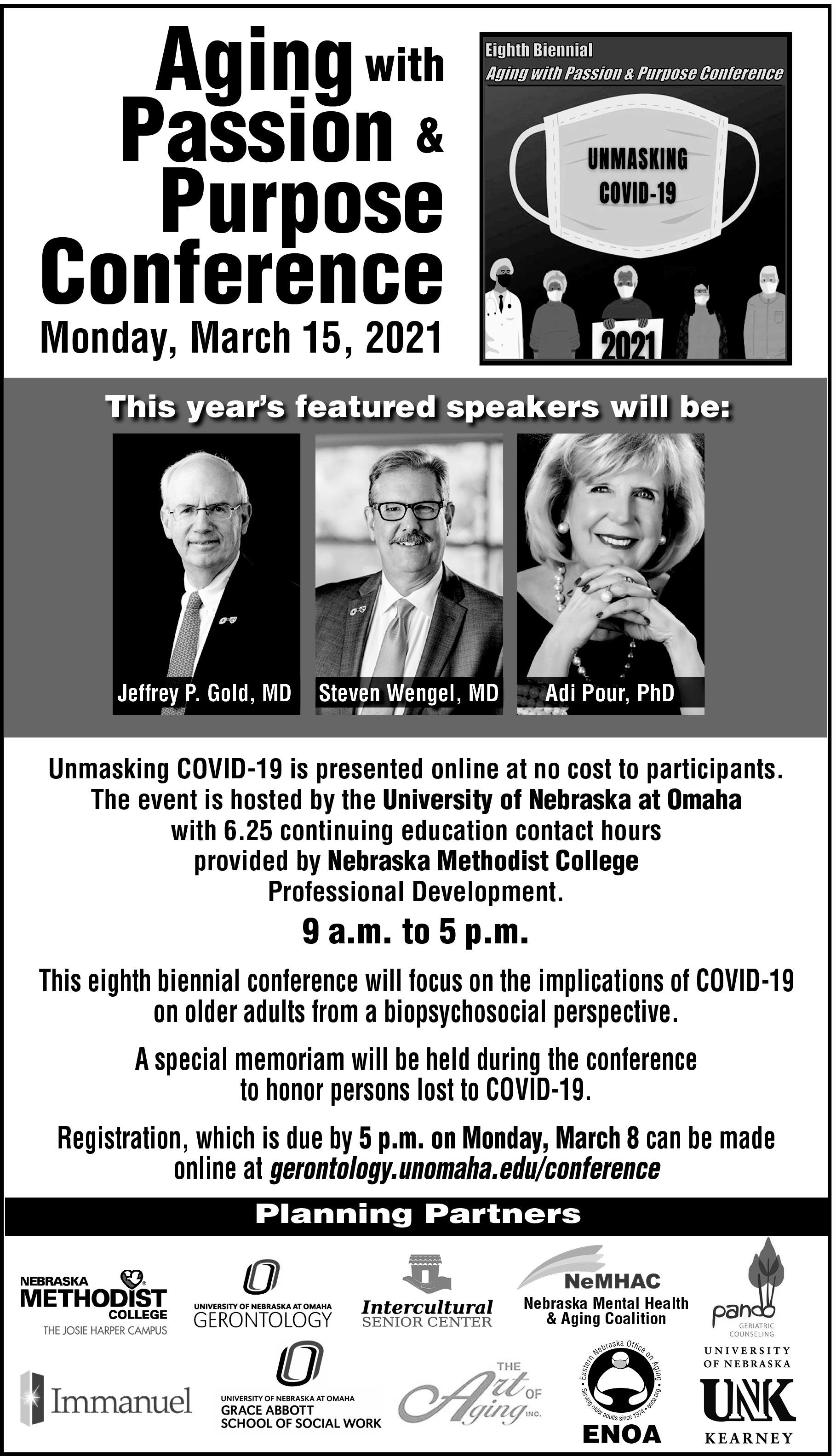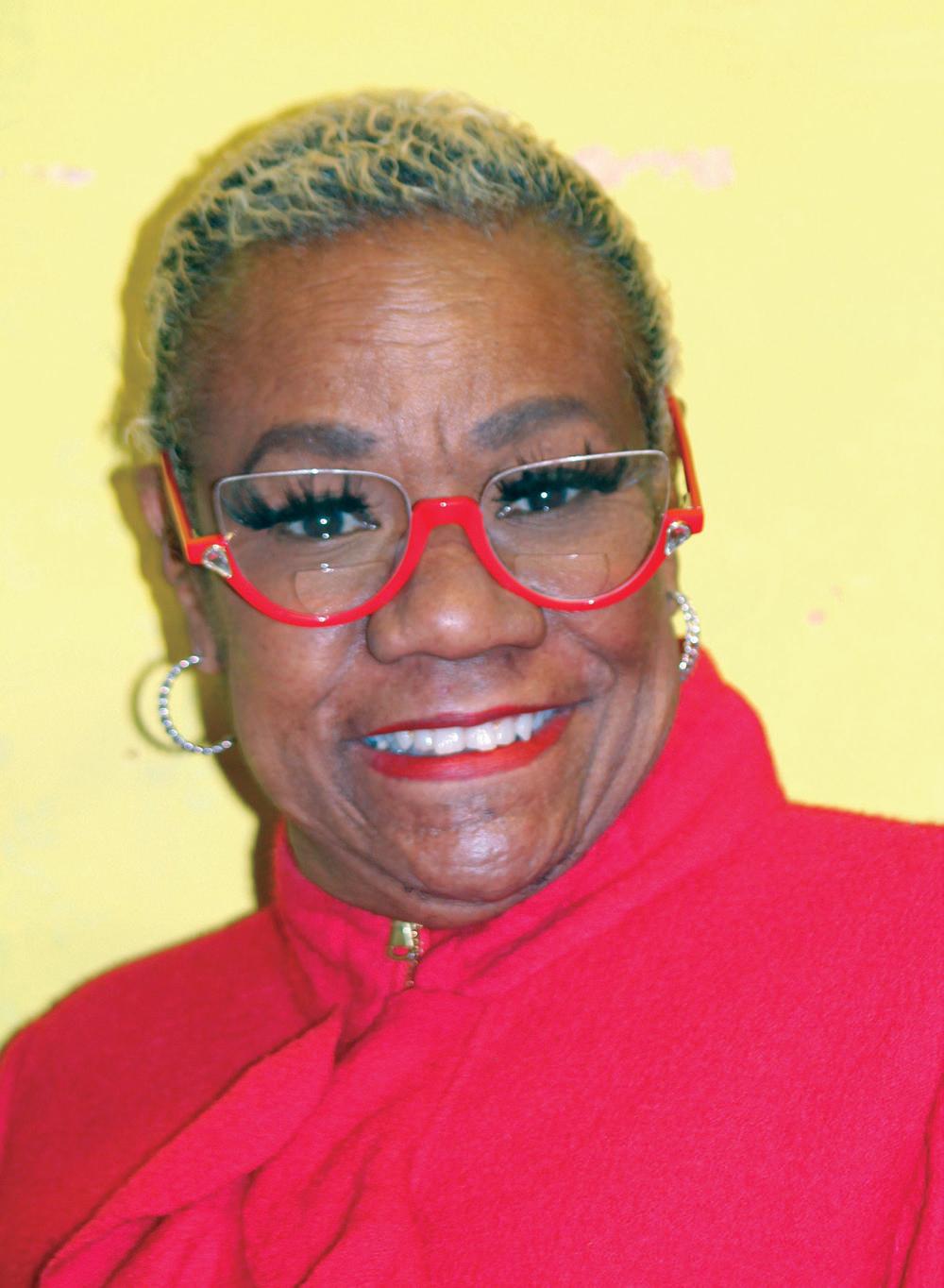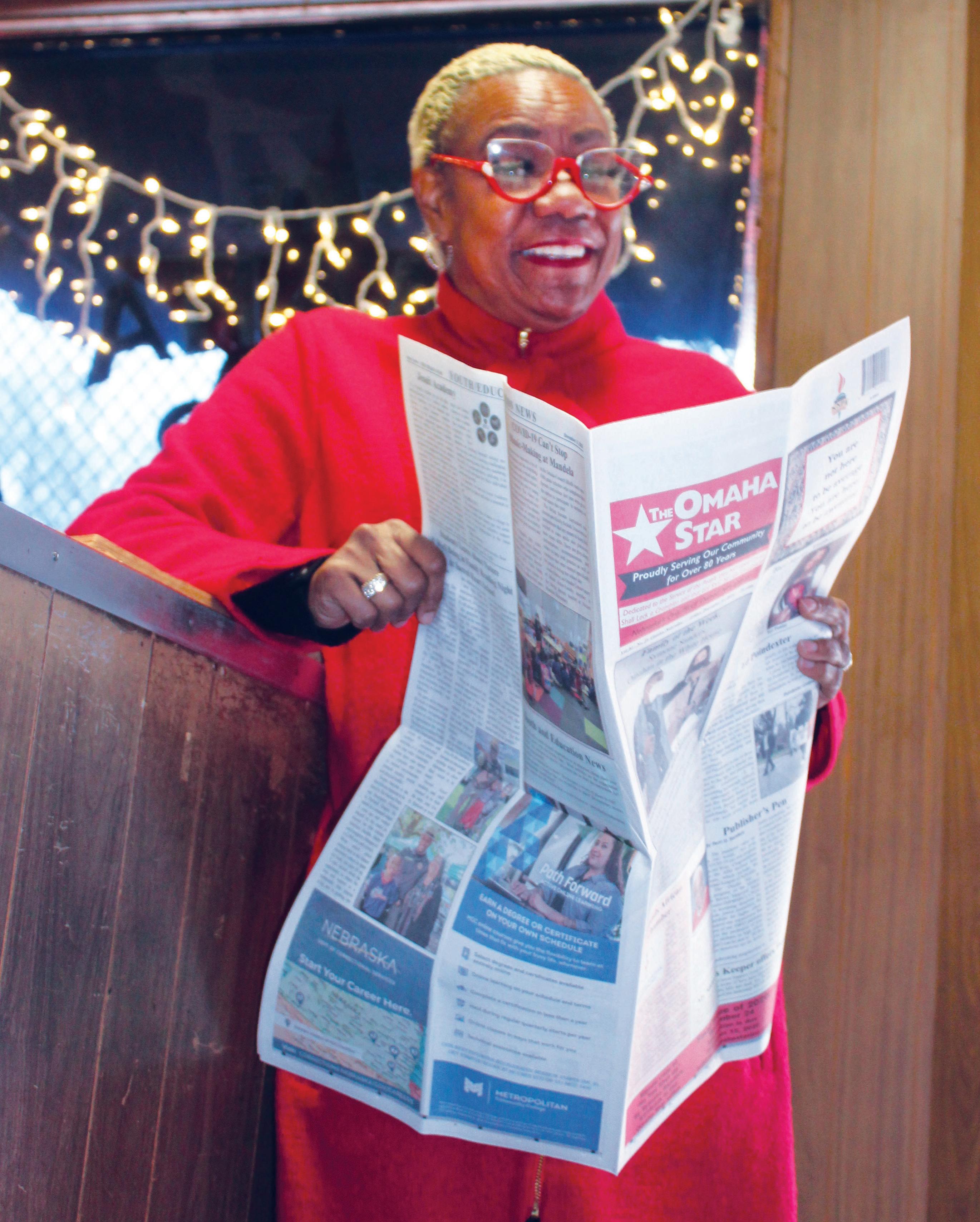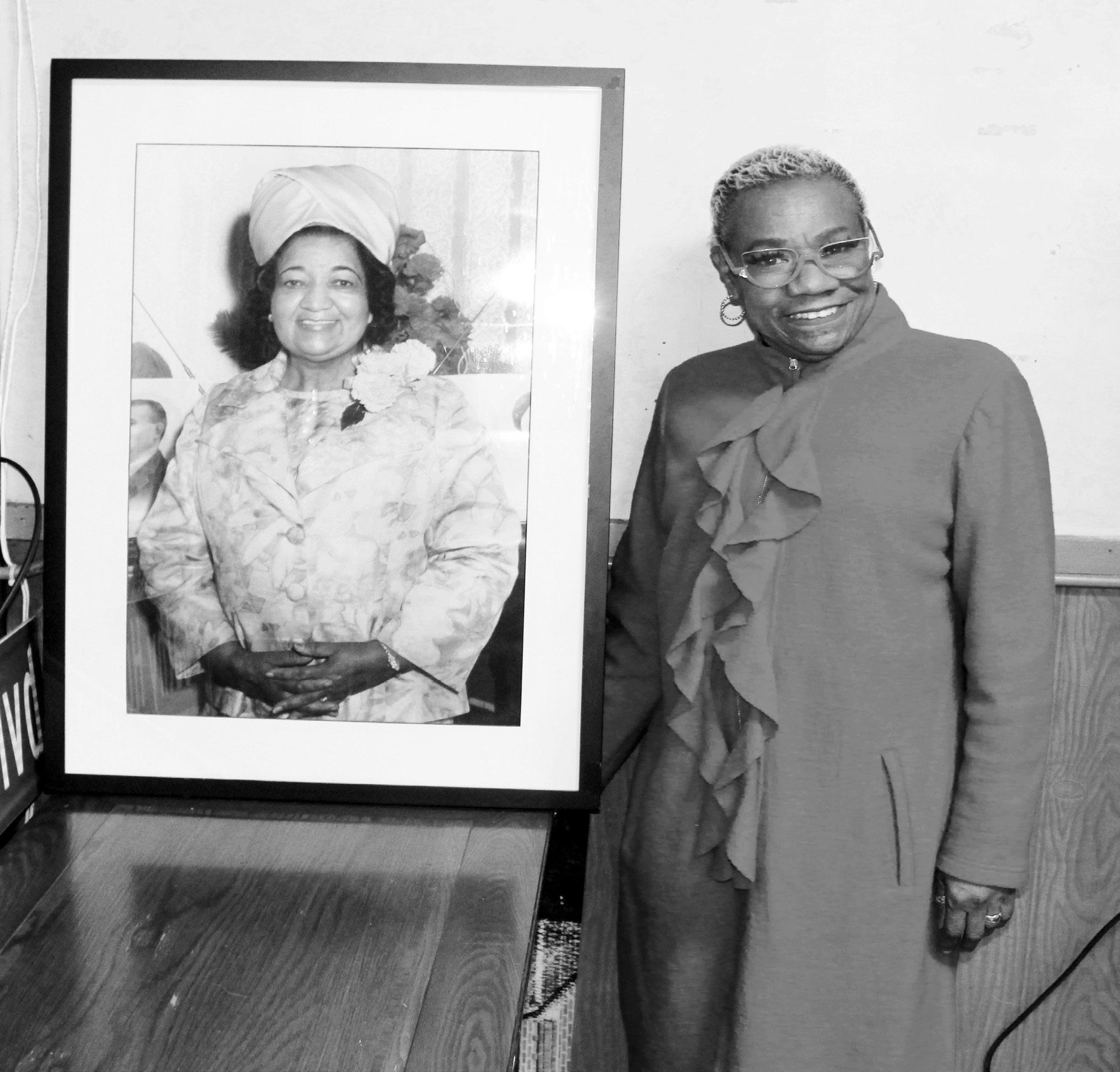
23 minute read
Look out for vaccine scammers
Call 1-844-268-5627 Disaster Relief Line offers free legal advice during the pandemic
Nebraskans who have questions or who are experiencing legal problems due to the coronavirus/ COVID-19 public health emergency can get legal advice and help through the free COVID-19 Disaster Relief Hotline.
Advertisement
Hosted by Legal Aid of Nebraska, working closely with the Nebraska State Bar Association’s Volunteer Lawyers Project (VLP), this hotline aims to make key legal assistance easy and accessible.
If you’re a Nebraskan facing legal issues related to the virus, or the owner of a small, locally-owned business (less than 50 employees, and not a franchise) that’s closed, in risk of permanent closure due to the virus, and where the payment of fees would significantly deplete your resources, the hotline may be reached at 1-844-268-5627.
Callers will be connected to the hotline’s voicemail. Callers should leave their name, phone number, brief details of the problem and the assistance needed, and in what county they’re located.
Callers will receive a call back from an experienced Legal Aid staff member. Individuals and businesses that don’t qualify for Legal Aid’s free services will be directly referred to the VLP. The VLP will work to place cases with Nebraska volunteer lawyers who will provide free legal assistance.
The types of legal issues associated with COVID-19, and focused on by the hotline include: • Tenants with rent issues, including those facing eviction. • Debt problems, including debtors with garnishments or who are ordered to appear at a debtor’s exam. • Mortgage foreclosures, including advising on options for delinquent payments. • Unemployment insurance denials. • Employee rights, including sick leave and wage payments. • Government benefits available to low-income persons such as ADC, SNAP, AABD, and SSI. • Medicaid and medical insurance claims. • Drafting wills, health care power of attorney, and transfer on death deeds. • Domestic abuse and safety issues. • Elder abuse and exploitation. • Access to education. • Helping small, locally-owned businesses with business and employment related matters, including human relations issues, unemployment benefits, and contracts.
More information on these legal issues, including ways you can directly help yourself, are available at legalaidofnebraska.org.
Medicare covers the COVID-19 vaccine at no cost to you, so if anyone asks you to share your Medicare number or pay for access to the vaccine, you can bet it’s a scam.
Here’s what you need to know: • You can’t pay to put your name on a list to get the vaccine. • You can’t pay to get early access to a vaccine. • Don’t share your personal or financial information if someone calls, texts, or emails you promising access to the vaccine for a fee.
Con artists may try to get your Medicare number or personal information so they can steal your identity and commit Medicare fraud. Medicare fraud results in higher health care costs and taxes for everyone.
Protect yourself from Medicare fraud. Guard your Medicare card like it’s a credit card.
Remember: • Medicare will never contact you for your Medicare number or other personal information unless you’ve given them permission in advance. • Medicare will never call you to sell anything. • You may get calls from people promising you things if you give them a Medicare number. Don’t respond. • Medicare will never visit you at your home. • Medicare can’t enroll you over the phone unless you called it first. Check regularly for Medicare billing fraud. Review your Medicare claims and Medicare Summary Notices for any services billed to your Medicare Number you don’t recognize.
Report anything suspicious to Medicare. If you suspect fraud, call 1-800-MEDICARE.


The Star’s office at 2216 N. 24th St. is on
the National Register of Historic Places. By Leo Adam Biga
Contributing Writer
Omaha native Symone Sanders has enjoyed a fast rise as a national Democratic Party strategist and a senior political adviser. She served as press secretary for Bernie Sanders during his 2016 presidential bid. Now she’s chief spokesperson for Vice President Kamala Harris at the White House. What some don’t know is that Symone’s mother, Terri Sanders, is a community change agent and media veteran in Omaha who recently took the permanent reins as publisher of The Omaha Star newspaper.
Together, the Sanders own an unprecedented lineage as communications professionals among Omaha mother-daughter tandems. Part of that lineage is their respective roles in the Black woman legacy that distinguishes The Star.
From the newspaper’s 1938 founding by Mildred Brown who ran things until her death in 1989, to her successor, niece Marguerita Washington, through Phyllis Hicks, Frankie Williams, and now Terri Sanders, The Star has been led by women.
Though Symone was never the newspaper’s publisher, she did write for the paper and won a scholarship from the Mildred D. Brown Memorial Study Center, which now owns and manages the publication. Terri wrote a fashion column for The Star years before becoming its publisher.
Last fall, Terri enjoyed the privilege of running front page news in The Star of Symone being tabbed for her prestigious White House post. While the daughter is squarely in the limelight now as a Beltway insider and Terri is one proud mother, there’s more to this dynamic older adult’s story than being the mother of Symone Sanders. Start with the revealing self-description Terri Sanders shares on her social media:
“I AM A HANDFUL. I’m strong willed, independent, a bit outspoken, and I tell it like it is. I make mistakes, I am sometimes out of control, and at times hard to handle, but I love and give with all my heart. If you can’t handle me at my worst, then you sure don’t deserve me at my best. Excellence is the standard. Extraordinary is the goal.”
It’s exactly what you would expect from a woman whose famous daughter, Symone, author of the book No, You Shut Up: Speaking Truth to Power and Reclaiming America, is known for her own frankness and settle-for-nothing-but-thebest approach. It’s clear the apple did not fall far from the tree.
Terri recently shared a “personal philosophy” for life that further reflects both her and her daughter’s live-out-loud attitude:
“When I go, I want to have burned the candle at both ends, straight up the middle, and leave nothing but dust.”
Terri, a proverbial go-getter has been chasing her bliss since childhood. Much of her take-all-that-life-has-to-offer mindset comes from her late parents, Opal and James McAlister, and other influential older adults whose zeal for life and work rubbed off on her.
Terri’s mother was from Tennessee and her father from Kansas. The pair met in Omaha where the couple aspired to greater things. He was a porter for the Union Pacific Railroad. She was a seamstress and a cosmetologist. Terri entered the world as a bonus baby 16 years after her only sibling, Juan. By the time of Terri’s arrival, her parents were older and brooked no nonsense.
“My parents owned their own business, McAlister Beauty Supply. It was the first African American beauty supply in Nebraska. It started out in our basement. The insurance agent told my parents they could not have all those chemicals in the basement because it was a fire hazard, so they got a commercial location on the corner of 24th and Wirt (streets). My brother Juan had a photo studio in the same building which was right next to Reed’s Ice Cream.”
Industrious by nature and nurture, Sanders adopted the strong work ethic and serious mojo of her parents, who didn’t coddle her but instead expected their daughter to exhibit maturity and responsibility.
“When I was in the second grade on Saturday mornings, I didn’t watch cartoons, I stocked beauty supply shelves, rode in the car for deliveries, hopped out, and took things into the beauticians and barbers,” she recalled.
Terri also worked at her aunt Edna Robinson’s north side florist shop, Robinson Flowers, one of the few Black-owned stores of its kind in Omaha then.
“So, I always knew about entrepreneurship and how it was not a hustle, it was a job.”
Star publisher Mildred Brown was perhaps Omaha’s most visible Black entrepreneur. “She was always present in the community,” Sanders said. “She was (seemingly) at every church program, every tea, (and) every fashion show. Whatever was going on, she was there.”
Brown cut quite a figure with her tailored dresses and designed corsages and as the face and voice of a Black community when it had precious few media outlets to tell its stories or air its concerns.
“I always knew about Mrs. Brown and The Omaha Star. I always read The Omaha Star. I thought she was a regal lady and someone that you could pattern yourself after working in the community – her elegance, grace, and her business mind,” Terri said.
Sanders played a small part in helping maintain Brown’s image.
“My Aunt Edna actually made the corsages Mrs. Brown wore. Mrs. Brown ordered seven three-flower white corsages every week. That was her standing order because she wore a fresh
Terri is a graduate of Omaha Central High School and Creighton University.

one every day. I got a chance to work on those flowers when I was learning to make corsages.”
In a life of full circle experiences, Sanders never suspected from those early brushes with Brown and The Star that she would one day be in the succession line as publisher.
“It’s phenomenal to me I am here today having done that back then. Given the honesty of The Star’s coverage of civil rights during Jim Crow and its history of uninterrupted publication, I feel a responsibility to report the truth and to not miss an issue.”
The paper has survived the COVID-19 crisis without a hitch, retaining its core advertisers at a time when many print publications struggle holding their own. Sanders knows The Star’s no longer the once indispensable news and information source it once was due to today’s plethora of content-rich online platforms. But she plans to make it a must-read again – capturing as many new subscribers and regular followers as she can from the city’s African American base.
“I think there are people we don’t reach because they’re not avid readers or they don’t know what The Omaha Star is, or because they get their news and information online. In 2021 I’m going to introduce what I call Omaha Star 3.0, where I do interviews, podcasts, Facebook Lives, Instagram Lives with people in our community who have an interesting story, including entrepreneurs, and then follow up with a story about them in the paper.
“We have to bring The Omaha Star to where the people are and engage them in the way they consume content. We need to engage millennials or the paper will die.”
Terri also has a goal to return The Star to being a weekly paper – it’s presently a bi-weekly – in perhaps 2022. She said its older subscriber base misses the weekly Star and it only makes sense to keep the paper in front of people and events.
“You can’t make that kind of change in the middle of the stream,” she added.
Sanders feels the weight of tradition and history she stands on at The Star, whose brick office building at 2216 N. 24th St. is on the National Register of Historic Places. The back of the building contains the intact apartment Brown kept there. Her presence is unmistakable.
“Starting with Mrs. Brown and going forward though Marguerita (Washington), Phyllis Please turn to page 9.
--Continued from page 8. (Hicks), and then Frankie (Williams) – that’s a lot of shoes to have to stand in. And you have to get it right,” Sanders said.
Her being there is no quirk as she prepared herself to be a journalist at Omaha Central High School where she wrote for the school paper and yearbook, and at Creighton University where she majored in public relations. That education, she said, “has served me well.”
In addition to Brown, Sanders looked up to another Omaha Black woman in media, Bertha Calloway, who worked at then-WOW TV before co-founding the Great Plains Black History Museum with her husband, James, in 1976.
Sanders, who assisted with cataloging artifacts in the museum’s earliest years, admired Calloway’s “ballsy and determined” drive to make the museum a reality against all odds.
Strong, accomplished Black women like Calloway and Brown surrounded Sanders, some as near as her own aunt and mother, and became her role models by osmosis.
“These were women in your everyday life. They were not cover stories in a magazine. They were people living their lives and doing what they did in their community.”
They showed Terri what was possible.
Sanders was smitten with the idea of working in the media and her ambition was realized as an on-air talent at Black-owned KOWH Radio while she was still in high school.
“I obtained my radio broadcast license with an endorsement at 16 years old,” said Sanders.
While attending college, Terri worked as a floor director and camera operator at KMTV. She helped lens the popular local show, Creature Feature, hosted by Dr. San Guinary (KMTV director John Jones), and participated in its on-set antics.
Meanwhile, Sanders developed a social conscience and civics bent from the activism she was exposed to at Omaha’s Zion Baptist Church, where her family attended services and events.
“My father was active with the local NAACP (National Association for the Advancement of Colored People) chapter. His best friend was the president, Lawrence McVoy. I went to those meetings with my father at Zion. My father and mother were involved in the 4CL (Citizens Coordinating Committee for Civil Liberties). Because they had their own business, they may not have marched, but they certainly supported and attended meetings.
“Whenever Black speakers came to town like Tony Brown (journalist) or Stokely Carmichael (activist) my mother believed I should go and hear what they had to say. It didn’t matter that I was 6 or 7 years old. What did that have to with anything? So, I’ve always had that kind of interest and upbringing. I always attended talks and meetings. I was just always around everything. That was important. I guess that’s where I get my community spirit.”
Then there’s the accountability Sanders felt to do the right thing.
“Businesspeople always knew who you were. You couldn’t go anywhere and somebody didn’t know you. That causes you to walk a little differently, to act a little differently because you know you’re going to get caught.”
Respecting the family name by acting appropriately was the expectation. “That was always impressed upon me,” Terri said.
Sanders parented the same way with her three children, holding them to high standards, taking them to otherwise adult events, all to help build their character and sense of self.
She made sure her children had something productive to do with their time.
“You can’t just bump through life; you’ve got to

Terri’s daughter,
Symone Sanders, is Kamala Harris’
national spokeswoman. Please turn to page 10. Under Sanders’ leadership, The Omaha Star will celebrate the community
by focusing on the achievements, accomplishments, exemplary individuals, and the families the bi-weekly publication serves.


--Continued from page 9. have a plan.”
She also tried to imbue in her children a sense of “social responsibility” the same way it was modeled for her, which in turn become a way of life.
“It was just what I did and who I was. I’m keenly aware of the community vibe that was built within me and obviously that’s why I am dedicated to working in my community.
“I am planted in this community. I’m not going anywhere. I tell people I have only worked up and down 24th Street. I’ve never really worked anywhere else, and I’m very proud of that. That’s why I am so passionate to see that whatever is done in this corridor is done right.”
Most of Sanders’ formal schooling played out there, too (Lothrop Elementary, Central, Creighton). She chose Creighton to expand her horizons with folks from different backgrounds. Terri remembers her Creighton years fondly.
“I had friends there from all over the country. When we had a vacation break, I went home with them. By the same token on weekends, they would come to my home, have dinner, (and) go to church. The education I received at Creighton prepared me to do anything I wanted.”
Alifelong love affair with the South was initiated when Terri’s mother and a former classmate of hers in Tennessee conspired to have their daughters meet. Starting in middle school, a tradition ensued in which Sanders would travel every year to Memphis to spend Thanksgiving with her new friend, Beverly Hyter. That first trip in the late ‘60s, the girls attended a concert featuring Stax recording artists, including Isaac Hayes. The new gal pals bonded over music, boys, and Southern charms.
“I loved it. Memphis is a magical city,” Sanders said.
Terri and Hyter are still friends to this day. They talk at least twice a week. Memphis remains a home away from home for Sanders, who claims the world is her stomping ground.
Upon graduating from college, Sanders wanted to live in the South because she enjoyed the people and food there, and because while the region has racist tendencies, for the most part, things are very progressive for Blacks in the South.
She fell in love with a Southern gentleman, Daniel E. Sanders. The Clarksdale, Miss. native was a U.S. Air Force dental technician stationed at Offutt Air Force Base in Bellevue when they met. They were separated temporarily when she took an insurance underwriter job in New Orleans and he got reassigned to Japan.
The couple married when Daniel got a new assignment. Son, Daniel II was born in Alaska. Daughters Symone and Averi were born in Omaha.
After retiring from the military, Daniel Sr. worked for the U.S. Army Corps of Engineers, and later, in Metropolitan Community College’s buildings and facilities department.
He died in 2017 following a massive stroke. Sanders misses his steadiness, spirit, and the kind of person he was.
Over the years, Terri has worked as a selfemployed seamstress, a certified balloon artist, a personal chef-caterer, and a wedding planner. She combined these and other services under TD Sanders & More.
“I could sew your wedding dress, plan your wedding, coordinate what happened the day of the event, and advise you on the best prices and items. At one time I sold cards, crafts, invitations, and stationery. I bought a hot press machine to make napkins and put impressions on ribbon so that I could make it real special.”
She evolved the business into a technology concierge service to keep people connected with their personal, professional, and social networks.
Today at age 63, Terri prides herself on her tech savvy.
“I don’t let any technology pass me by. If I do not keep up with technology, I would not be able to keep up with my children.”
Before becoming The Omaha Star’s publisher in 2020, Terri was the vice president of marketing and development for Omaha’s Black History Museum in 2013 before becoming its executive director two years later.
“The museum had had non-functioning status for several years and I brought it back,” she said. “I coined the phrase, ‘the building is closed, but the museum is open.’ We took exhibits out to businesses and schools so they could see what the museum had.”
Sanders eventually found a temporary site for the museum at the Crossroads Mall. Her successor Eric Ewing arranged for its current space in the historic Jewell Building on North 24th Street.
Sanders’ resume also includes a stint as site manager for the Omaha Economic Development Corporation’s multi-million-dollar Fair Deal Village Marketplace, which includes a grocery store, restaurant, and shops at 2118 N. 24th St.
While the marketplace has struggled finding a steady clientele and keeping a restaurant on site, Sanders said it’s still viable but some of the paradigms have to shift.
She also worked as the office manager for the Seventy-Five North Revitalization Corp.
Then came her reconnection with The Star, whose pages she’d appeared in many times as a news subject or source.
Terri is also the executive director of the Mildred D. Brown Memorial Study Center on whose board she served.
She said her varied experiences have well prepared her for these jobs. “I think all the things I’ve done combined to bring me to where I am. I’m where I’m supposed to be.”
Her mission is to maintain The Star as a vital conduit for good news.
“I think The Omaha Star has contributed to the fabric of our community. It tells the story of the people. It may not be Omaha World-Herald news that your daughter was just accepted to an historically black college, but it’s news for The Omaha Star.
“I try to continue the legacy of telling the everyday story of successes (including business launches, job promotions, scholarships, and recognitions). I brought back the Family of the Week series. It was a staple of the paper. It’s important people know there are strong families in our community.”
She said the newspaper focuses on achievements, accomplishments, exemplary individuals and families to celebrate the community.
Sanders is proud to operate a business on North 24th Street, a district that’s still full of life today, even amidst its vacant lots and abandoned buildings. She supports revitalization efforts happening there and feels The Star is a catalyst for change.
She believes the area is poised for new growth. “I see it making a comeback. I’m aware of people developing some of these old buildings that have stood empty for years.”
Sanders said she is impressed by the energy and the passion of several dynamic young African Americans emerging as social entrepreneurs in Omaha.
Terri is mindful of finding someone to mentor as a potential successor at The Star one day.
“Yes, I am always looking for Black females who may have an interest. Maybe that person will come along, and when they do, I would like to help guide them into a leadership position.”
The Sanders family legacy is part of Omaha’s history. Terri and Symone are bound to be highlighted one day at the Great Plains Black History Museum for their respective feats.
“Everything has its time and place, so if it’s the time and the place, then great,” Terri said.

Sanders with a photo of Mildred Brown, who founded The Omaha Star in 1938.
Preregistering for a COVID-19 vaccination may help you receive the vaccine sooner. Kohll’s opened a preregistration form (kohllsrx.com) in December 2020 and has already registered more than 17,000 individuals, many of whom are age 75 or older, and some with health comorbidities.
The state of Nebraska is also setting up a preregistration program for the vaccine which may be available by the time you read this article.
Based on Centers for Disease Control and Prevention vaccination priority announcements, individuals who qualify for a vaccination may not have been notified yet because Kohll’s and other local providers haven’t received the vaccine for that group.
Kohll’s is administering the vaccine provided by local county health departments to nursing care facility residents and staff, persons with a developmental disability, and families that care for persons with a developmental disability.
Kohll’s has administered more than 3,000 doses of the vaccine so far to people in those groups.
When Kohll’s receives vials of the vaccine designated for a specific group, men and women in that group will be notified via an email and/or a text message based on the information provided by the consumer when registering. The email and/or text will contain a link to sign up for a date, time, and Kohll’s location for the vaccination.
It’s important for recipients to come to the vaccine site no more than 15 minutes before the scheduled vaccination time so social distancing can be maintained and vaccinations can be administered quickly and efficiently. The COVID-19 vaccine is provided at no charge to consumers by the federal government. In some cases, Kohll’s and other providers are paid by insurance companies to administer the vaccine. There’s no copay or charge for the vaccine. It’s important for recipients to bring a copy of their insurance card with them when receiving the vaccination.
The federal government will pay for vaccine administration to the uninsured.
Medicare Advantage plans don’t pay for the vaccine administration. These policies require consumers to provide the red, white, and blue Medicare card to pay for a vaccination.
After a vial of the COVID-19 vaccine is opened, persons giving the shots have six hours to administer the vaccinations. At the end of the day, leftover vaccine is administered to men and womdesignated by the counties, so none is ever wasted.
Information about the COVID-19 vaccine, its availability, and the vaccinations process is changing rapidly. Go to kohllsrx.com to learn more.
We want to hear from you.
• Do you have questions about the Eastern Nebraska Office on Aging, its programs, or services?
• Do you have a comment about the agency and how it serves older adults in Douglas, Sarpy, Dodge, Cass, and Washington counties?
• Do you have a story idea for the New Horizons newspaper, or would you like to receive a FREE copy each month?
Please send your questions, comments, and story ideas to:
enoa.info@enoa.org
We appreciate your interest in ENOA and the New Horizons.
Call 402-554-5961 to learn more Healthy adults 19 to 90, caregivers needed for UNO Gerontology study

The University of Nebraska at Omaha’s Department of Gerontology is looking for healthy adults and caregivers for an older adult with a chronic disease (e.g., dementia, cancer, cardiovascular disease) to participate in a research study about the impact of aging on the neural and behavioral bases of social processing.
Participation will involve an online, at-home component (seven hours over four days) and one in-person visit (two hours and 30 minutes) which will take place at the University of Nebraska Medical Center.
Compensation for study participation is available. Complementary parking is located a short walk from the lab.
The experiment involves completing online questionnaires/interviews and computer tasks, taking samples of saliva for hormone analyses, a blood draw for DNA methylation analyses, and undergoing brain imaging using functional magnetic resonance imaging. To be eligible for the study, participants must be age 19 to 90, have a comprehension of written and spoken English, the mobility to travel to the UNMC campus, and have completed a minimum of two years of high school or higher.
Potential participants aren’t eligible for the study if they have a diagnosis of a neurological or psychiatric disease (e.g., stroke), a history of drug abuse, vision, hearing, cognitive, or motor difficulties, or if they’re pregnant, have metal implanted in their body, or are taking an antidepressant medication, a glucocorticoid-based oral medication or cream (e.g., prednisone, cortisone), or are on hormone replacement therapy.
For more information, please contact Janelle Beadle, Ph.D. at the Aging Brain and Emotion Lab (402-554-5961) or by email at ABELabUNO@gmail.com.







